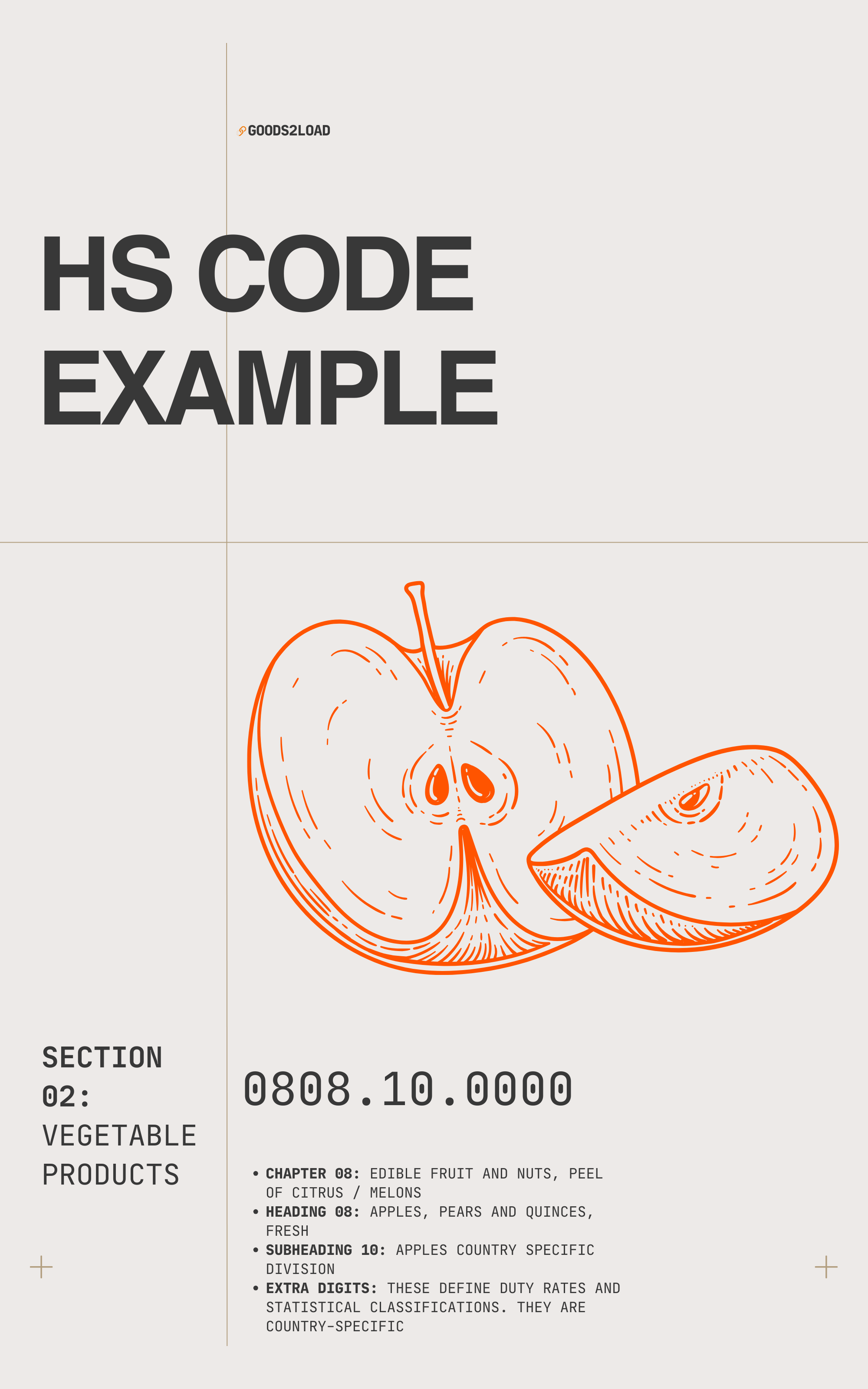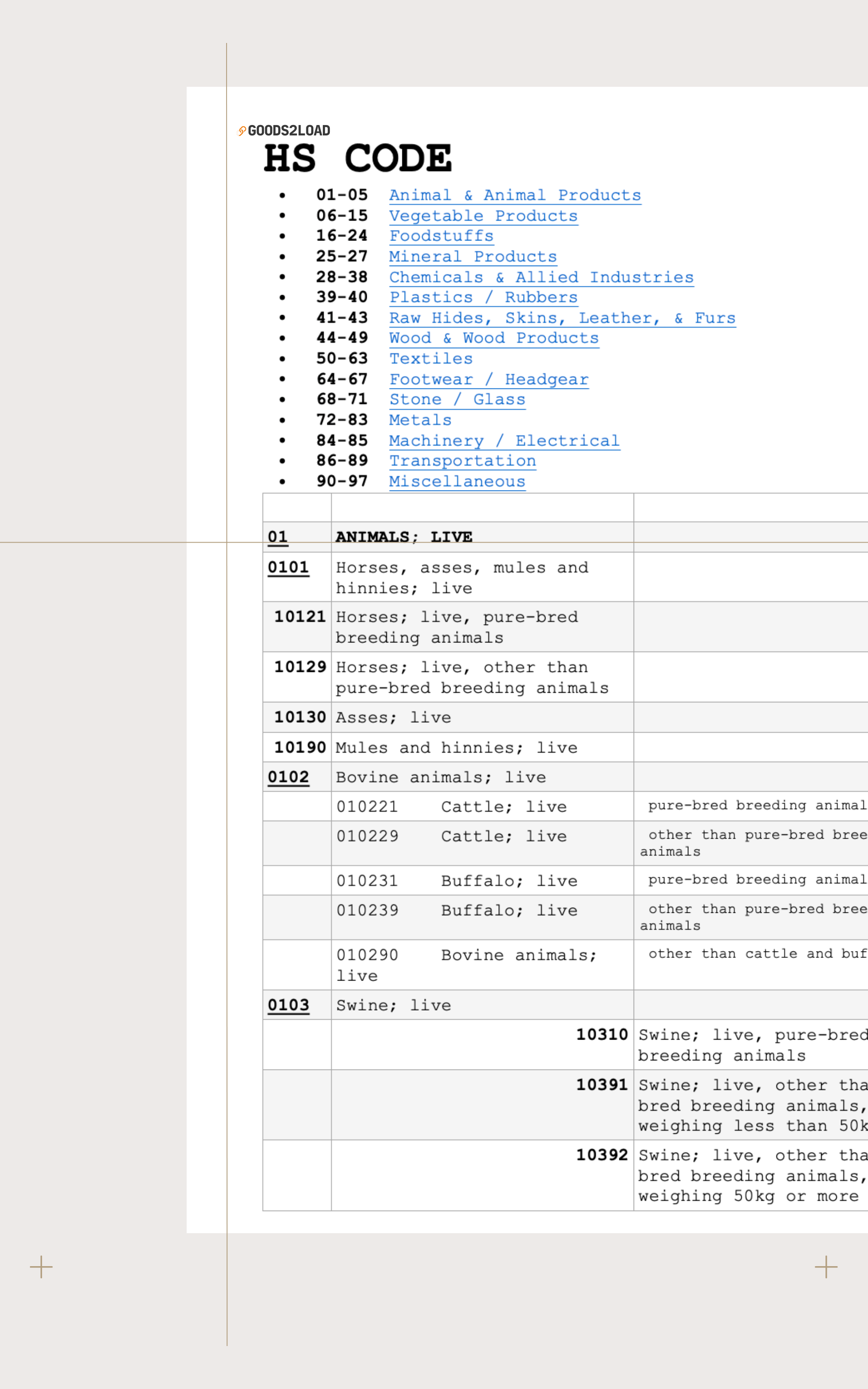Structure of HS Codes
Section and chapter breakdown
The Harmonized System (HS) is organized into 21 sections and 99 chapters, providing a logical structure for classifying goods. Each section represents a broad category of products, while chapters offer more specific classifications within those categories.
This structure helps businesses worldwide, including those in Dubai and the UAE, accurately classify their products for customs, ensuring compliance and smooth trade.Familiarizing yourself with the relevant sections and chapters can significantly streamline the classification process.
For companies importing or exporting goods through Dubai Customs, understanding this breakdown is essential for effective HS Code determination. It allows you to pinpoint the right category quickly, ensuring that your goods are accurately declared and minimizing the risk of misclassification penalties.
|
Section
|
Description
|
Chapters
|
|
I
|
Live animals; animal products
|
1-5
|
|
II
|
Vegetable products
|
6-14
|
|
III
|
Animal or vegetable fats and oils
|
15
|
|
IV
|
Prepared foodstuffs; beverages, spirits, and vinegar; tobacco
|
16-24
|
|
V
|
Mineral products
|
25-27
|
For businesses dealing in these sectors, Goods2Load offers specialized customs clearance services and HS Code classification assistance, handling your products with precision throughout the shipping process.
6-digit international standard
The core of the HS Code is a 6-digit code that is standardized internationally. This uniformity ensures consistent classification across countries, facilitating global trade and data comparison. The 6-digit code is structured as follows:
- First two digits: Chapter
- Next two digits: Heading within the chapter
- Final two digits: Subheading for specific product details
For example, the HS Code 090111 breaks down as:
- 09: Chapter (Coffee, tea, maté and spices)
- 0901: Heading (Coffee)
- 090111: Subheading (Coffee, not roasted, not decaffeinated)
Many countries, including the UAE, add additional digits for further classification and duty determination. However, the first 6 digits remain consistent globally, ensuring a common language for international trade.
At Goods2Load, we help businesses navigate this complexity with expert HS Code lookup tools and experienced customs agents. We ensure your products are classified correctly, save time, and avoid potential fines.
HS Code vs. Schedule B Code
Key differences
While HS Codes and Schedule B Codes are related, they serve different purposes and have distinct characteristics. HS Codes are used globally for import and export classifications, while Schedule B Codes are specific to U.S. export statistics.
For businesses in Dubai and across the UAE engaging in trade with the United States, understanding these differences is crucial for accurate documentation and compliance with both systems.
HS Code characteristics:
- Used internationally for imports and exports
- 6-digit standard with country-specific extensions
- Maintained by the World Customs Organization
Schedule B Code characteristics:
- Used for U.S. export statistics only
- 10-digit system based on HS Codes
- Maintained by the U.S. Census Bureau
When to use each code
Knowing when to use HS Codes versus Schedule B Codes is essential for smooth international trade operations, especially for businesses in Dubai and the UAE that frequently trade with the United States.
Use HS Codes for:
- General international trade transactions
- Import/export documentation in most countries
- Determining applicable tariffs and duties
Use Schedule B Codes for:
- Exporting goods from the United States
- Completing U.S. Electronic Export Information (EEI)
- Reporting U.S. export statistics
For UAE-based companies exporting to the U.S., it's advisable to be familiar with both systems to ensure compliance with U.S. customs requirements and accurate statistical reporting.
Finding the Correct HS Code for Your Product
Online resources and tools
Numerous online resources and tools are available to help businesses in Dubai and across the UAE find the correct HS Codes for their products. These digital solutions can significantly simplify the classification process and reduce the risk of errors.
Goods2load offers a comprehensive HS Code lookup tool tailored for businesses operating in the UAE. This user-friendly platform allows users to search for codes based on product descriptions, keywords, or existing code numbers, providing accurate and up-to-date information.
Useful online resources for HS Code lookup:
- World Customs Organization HS database
- UAE Federal Customs Authority website
- International trade databases
- Industry-specific classification guides
Consulting customs brokers
While online tools are valuable, complex products or unique situations may require expert assistance. Consulting with experienced customs brokers can provide additional insights and ensure accurate classification.
Customs brokers in Dubai and across the UAE possess in-depth knowledge of local regulations and international trade practices. They can offer personalized guidance on HS Code selection, helping businesses navigate challenging classification scenarios and minimize compliance risks.
Benefits of consulting customs brokers:
- Expert interpretation of classification rules
- Assistance with complex or ambiguous products
- Guidance on local customs requirements
- Support for tariff optimization strategies
At Goods2Load, we understand the challenges of finding the right HS Code and are here to assist with our comprehensive resources and expert advice, making the process smoother for you.
HS Code Classification Challenges
Common mistakes to avoid
Proper HS Code classification is crucial, but it's not always straightforward. Businesses in Dubai and across the UAE should be aware of common pitfalls to ensure accurate product classification and avoid potential compliance issues.
Some frequent mistakes include:
- Relying solely on product names without considering composition or function
- Overlooking specific product characteristics that affect classification
- Using outdated HS Codes without checking for revisions
- Misinterpreting classification rules or notes
To minimize these errors, it's essential to thoroughly research product details, stay informed about HS updates, and seek expert advice when in doubt.
Dealing with complex products
Complex products, such as multi-functional devices or items with multiple components, can present significant classification challenges. These products may potentially fall under multiple HS Code categories, requiring careful analysis to determine the most appropriate classification.
For businesses in Dubai and across the UAE dealing with complex products, consider the following approaches:
Strategies for classifying complex products:
- Apply the General Rules of Interpretation (GRI)
- Consult explanatory notes and rulings
- Seek binding rulings from customs authorities
- Utilize the expertise of customs brokers or trade consultants
At Goods2Load, we are committed to helping businesses navigate the intricacies of HS Code classification and ensuring that their products are accurately classified to facilitate smooth trade operations.
Importance of HS Codes in Customs Procedures
Tariff determination
HS Codes play a pivotal role in determining applicable tariffs for imported goods. In Dubai and across the UAE, customs authorities use these codes to assess duties and taxes on incoming shipments, making accurate classification essential for proper cost calculation and compliance.
Proper HS Code usage enables businesses to:
- Accurately estimate import costs
- Identify potential duty savings opportunities
- Ensure compliance with customs regulations
- Facilitate smooth clearance processes
Trade statistics and analysis
Beyond their role in customs procedures, HS Codes are fundamental to compiling and analyzing international trade statistics. For businesses and policymakers in Dubai and the UAE, these statistics provide valuable insights into trade patterns, market trends, and economic performance.
Applications of HS Code-based trade statistics:
- Market research and opportunity identification
- Trade policy development and negotiation
- Economic impact assessments
- Supply chain optimization
At Goods2Load, we emphasize the importance of correct HS Code classification to facilitate seamless customs procedures and maximize opportunities in the international market.
HS Code Updates and Revisions
World Customs Organization's role
The World Customs Organization (WCO) is responsible for maintaining and updating the Harmonized System (HS). This international body regularly reviews and revises the HS to ensure it remains relevant and effective in classifying modern products and addressing emerging trade issues.
The WCO's revision process involves:
- Collecting proposals from member countries and stakeholders
- Reviewing and analyzing suggested changes
- Drafting and approving amendments
- Publishing updated HS editions
Staying informed about changes
For businesses in Dubai and across the UAE, staying up-to-date with HS Code revisions is crucial for maintaining compliance and accuracy in international trade operations. Major updates typically occur every five years, with the most recent revision implemented in 2022.
To stay informed about HS Code changes:
- Regularly check the WCO website for announcements
- Subscribe to updates from the UAE Federal Customs Authority
- Utilize Goods2load's HS Code lookup tool, which is updated with the latest revisions
- Attend trade seminars and workshops focused on customs and classification topics
HS Codes and Free Trade Agreements
Free Trade Agreements (FTAs) often use HS Codes to determine product eligibility for preferential tariff treatment. Understanding how HS Codes relate to FTA benefits is crucial for businesses to maximize trade advantages.
Determining eligibility for preferential treatment
To determine eligibility:
- Identify the correct HS Code for your product
- Check the FTA's rules of origin for that HS Code
- Ensure your product meets the specified criteria
- Prepare necessary documentation to claim preferential treatment
Rules of origin considerations
Rules of origin in FTAs often reference HS Codes to specify the level of processing or value addition required for a product to qualify for preferential treatment. These rules can vary significantly between agreements and product categories.
Key factors to consider:
- Change in tariff classification requirements
- Regional value content thresholds
- Specific processing operations
- Cumulation provisions
Businesses in UAE should carefully review the rules of origin for their products under relevant FTAs to ensure compliance and maximize trade benefits.
HS Codes in Different Countries
Variations in national extensions
While the first 6 digits of HS Codes are standardized internationally, many countries, including the UAE, add additional digits for further classification and duty determination. These national extensions allow for more detailed product categorization and tailored tariff schedules.
Examples of national extensions:
- UAE: 8-digit system
- United States: 10-digit Harmonized Tariff Schedule (HTS)
- European Union: 8-digit Combined Nomenclature (CN)
Understanding these variations is crucial for businesses engaged in global trade to ensure accurate classification across different markets.
Harmonization efforts
Despite national variations, ongoing efforts aim to enhance global harmonization of product classification. These initiatives seek to reduce discrepancies and facilitate smoother international trade.
Key harmonization efforts include:
- Regular WCO Updates: Continuous updates to the core 6-digit HS Codes help maintain consistency across nations.
- Regional Classification Alignment: Initiatives within regions (e.g., the Gulf Cooperation Council (GCC)) aim to standardize classifications for easier trade.
- Bilateral and Multilateral Agreements: Countries work together to agree on classification practices, further facilitating trade.
Businesses in Dubai, UAE can benefit from these harmonization efforts through increased predictability and consistency in cross-border trade operations.
HS Code Compliance and Penalties
Consequences of misclassification
Incorrect HS Code classification can lead to serious consequences for businesses in Dubai and the UAE. Misclassification may result in:
- Incorrect duty payments
- Delays in customs clearance
- Fines and penalties
- Legal issues and reputational damage
The severity of consequences often depends on factors such as the nature of the misclassification, the value of goods involved, and whether the error appears intentional or negligent.
At Goods2Load, we offer resources to help navigate these complexities, ensuring your business stays compliant and informed.
Best practices for accuracy
To ensure HS Code compliance and avoid penalties, businesses in Dubai, UAE should adopt the following best practices:
- Invest in staff training on HS classification principles
- Implement robust internal classification procedures
- Regularly review and update product classifications
- Utilize reliable HS Code lookup tools
- Seek expert advice for complex or high-value shipments
- Consider obtaining binding rulings for recurring or uncertain classifications
- Maintain detailed records of classification decisions and supporting documentation
By following these practices, companies can minimize the risk of misclassification and associated penalties while ensuring smooth international trade operations.



